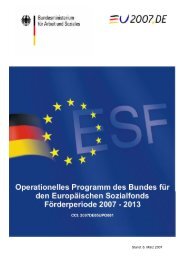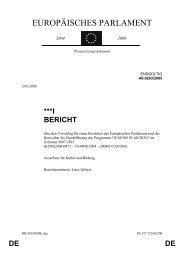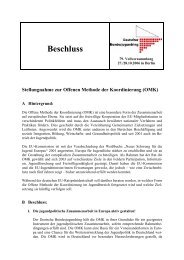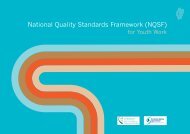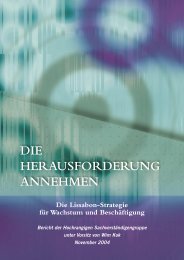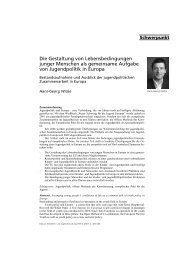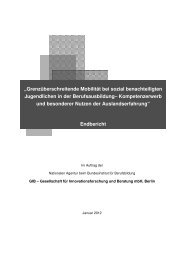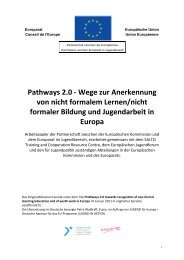Report - Salto
Report - Salto
Report - Salto
You also want an ePaper? Increase the reach of your titles
YUMPU automatically turns print PDFs into web optimized ePapers that Google loves.
Bridges for Recognition | Hot Issues discussion groups<br />
71<br />
3. Validation methodologies and quality assurance: making standards a reality in practice<br />
Validation is wider than accreditation. Equally, Youth organisations could validate skills acquired<br />
outside Youth activities or developed through Youth activities. Accreditation of skills acquired<br />
through Youth activities, however, is an important mechanism to show the added value of Youth<br />
work and the contribution of Youth organisations to developing a wide range of skills for young<br />
people. What instruments and validation methodologies can Youth organisations employ to<br />
assess that a person really did acquire new skills within the context of its activities? To take it<br />
a step further, how can fraud be avoided in this field? –e.g. how can it be avoided that people<br />
claim that they have acquired skills through the membership/work of a Youth organisation on<br />
their CV falsely? In formal institutions records of performance are kept, but similar records are<br />
not available in a Youth work context.<br />
4. Validation of non-formal learning and equality<br />
The danger exists that validation of non-formal education will benefit the young people who<br />
have already extensively benefited from formal education and exclude the less educated, who<br />
could benefit greatly from validation initiatives –in terms of self-esteem, career prospects,<br />
further education, etc. It is important that these groups are not excluded for reasons of social<br />
justice and also economic performance –E.g. validation will increase their employability and<br />
their possibilities for life-long learning which would increase their productivity in the longterm.<br />
How can these groups be reached to ensure that all young people can benefit equally from<br />
validation of non-formal and informal learning? Are some methodologies better suited than<br />
others to stimulate participation by groups, for example, which have had bad experiences in the<br />
formal education system?<br />
This point 4 was discussed in the Hot Issue discussion group ‘The Creaming Effect – Recognition<br />
and Equality’ (with Kathy Schroeder)



